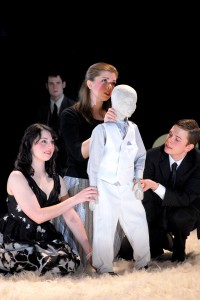
The cast of “The Winter’s Tale” maneuver a creepy doll as the representation for the character Mamilius instead of using an actor. Hanna Bazarian- Photo Editor
Shakespeare’s “The Winter’s Tale” is not a classic. It isn’t widely known, loved and lauded like the bulk of Shakespeare’s repertoire, and it is generally considered inferior to much of his work. Despite their innovative attempt, the UR International Theatre Program made no inroads upon endearing the play into the hearts of their audience.
The play itself is heavily steeped in Greek tradition, from the names of the characters to the structure of the production. The high level of drama exemplified by Greek tragedies was obviously apparent throughout the story arc — at one point the King even ordered that an oracle be consulted. The first act was set in the royal court of Sicilia, where King Leontes (senior John Amir-Fazli) and his pregnant wife Hermione (junior Leah Barish)* are entertaining Polixenes (junior Phil Dumouchel), visiting king of Bohemia and childhood best friend of Leontes.
Leontes becomes convinced that Polixenes and Hermione are having an affair and that the child Hermione is pregnant with is actually Polixenes’. Leontes attempts to poison Polixenes through his cupbearer, Camillo (junior Kevin McCarthy), but Camillo tips off Polixenes and they flee to Bohemia.
Leontes throws Hermione in prison and his young son Mamilius dies from the stress. In prison, Hermione gives birth to a daughter, Perdita (freshman Sarah Levenstam), whom Leontes orders abandoned and Hermione dies at the end of the first act. Classic Greek shit-hits-the-fan kind of tragedy.
In the second act, everything is resolved in a structural shift to comedy; the lost daughter Perdita falls in love with Polixenes’ son, Florizel, and everyone eventually lives happily ever after. In the climactic final scene, a statue of Hermione comes alive and rejoins the now mostly reunited family.
Like the Hermione of the Harry Potter series, the queen of Sicilia was witty, intelligent and friendly. This can be inferred from the clear regard exhibited by Polixenes and the nobles of the court, who all tried desperately to talk Leontes out of condemning her. Unfortunately, the audience felt no such affection for the doomed royal.
The highest point of the first act was one impassioned monologue from Paulina, lady in waiting to Queen Hermione, as she extolled the virtues of her imprisoned queen to the doubting husband. That is to say, feeling for the characters was difficult — despite the contemporary presentation of the production, the cast often felt completely distant from the audience.
The production itself was beautiful, though. Props to the mastermind who formulated the visuals offered by the play — the sets were truly stunning. The first act opened with a sumptuous wintry royal party, the kind you wish you were invited to. A great thing about “The Winter’s Tale” is how precisely staged the production was — at no point was there a dull moment, as every background character was continuously engaged. My favorite part of the first act was the slow motion scene changes — the party guests would slowly interact with each other to smooth, old-time party music.
A great aspect of the International Theatre Program is how willing it is to try new things, and integrate different styles of theatre and media into productions. For instance, the young Sicilian prince Mamilius was depicted through bunraku, a form of Japanese puppetry. The execution was commendable but creepy.
The puppet prince had no eyes, rendering Mamilius a nearly meaningless character when he should actually have played an integral role in the first act.
The structure of the action is such that no particular character is exclusively focused upon, and although, ostensibly, the story revolved around the crumbling of Leontes’ world, “The Winter’s Tale” is an ensemble work, so the choice of using a puppet to portray a character was odd, to say the least.
Similarly frustrating was the cast-wide habit of actors turning their backs on the audience for the sake of fluidity. Equally distracting was the lack of articulation, which was exacerbated by the reduced vocal projection that comes with turning one’s back on the audience. Shakespeare’s characters, folks, dost not speaketh like we doeth.
So when you are facing the opposite direction and mumbling your circuitous and sometimes semantically confounding Elizabethan lines, chances are good the audience will not be able to hear you or understand you, and will eventually lose interest in caring about what you are saying.
Every theatre program has its high points and low points, and maybe I was just expecting too much based upon previous experiences with the International Theatre Program, but the high point for “The Winter’s Tale” for me was leaving.
McLaughlin is a member of the class of 2014.
Correction: The role of Hermione is played by sophomore Stella Kammel.

